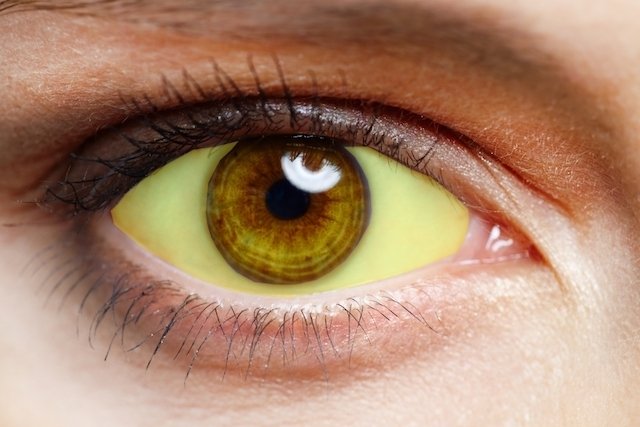The main symptoms that may indicate hepatitis are headache, malaise, lack of appetite, nausea, excessive tiredness, pain in the upper belly and yellow skin and eyes, in the most serious cases of the disease.
In most cases, hepatitis B does not cause any symptoms, especially in the first few days after infection with the virus. However, in some cases infection with the hepatitis B virus can be symptomatic, with the symptoms often being confused with a simple flu, ending up delaying the diagnosis of the disease and its treatment.
Watch the conversation between nutritionist Tatiana Zanin and Dr. Drauzio Varela, about hepatitis:
Main symptoms
The main symptoms of hepatitis B are:
- Yellowish color of the skin and eyes;
- Pain in the upper belly region;
- Swollen belly;
- Yellowish, gray or whitish stools;
- Dark urine;
- Constant low fever;
- Joint pain;
- Lack of appetite;
- Frequent nausea or dizziness;
- Excessive tiredness.
If hepatitis B is suspected, it is important that a hepatologist or general practitioner is consulted so that tests can be carried out to confirm the infection.
Don’t ignore the signs your body is giving you!
Hepatitis B Symptom Test
To find out your risk of having hepatitis B, select the symptoms presented in the test below:
The hepatitis B symptom test is only a guidance tool and does not serve as a diagnosis or replace consultation with a hepatologist, infectious disease specialist or general practitioner.
How do you catch hepatitis B
Some of the most common forms of hepatitis B contamination are:
- Intimate contact without a condom;
- Do a manicure with contaminated pliers;
- Share syringes;
- Getting piercings or tattoos with contaminated material;
- Have had a blood transfusion before 1992;
- From mother to child through normal birth;
- Skin injury or accident with contaminated needles.
Transmission of hepatitis B occurs through contact with blood or body secretions contaminated by the HBV virus. Saliva can also transmit this virus through bites, but not through kissing or other types of exposure to saliva. However, bodily fluids such as tears, sweat, urine, feces and breast milk are not capable of transmitting the disease.
How to protect yourself
The best way to avoid being infected with hepatitis B is to get vaccinated, however, it is also important not to have unprotected intimate relationships, as well as to wear gloves whenever it is necessary to come into contact with another person’s blood or secretions.
In addition, the hygiene and sterilization conditions of manicure or piercing and tattooing areas must also be confirmed, as there is the handling of objects that can easily cut the skin and contaminate the blood.
How the treatment is carried out
Treatment for acute hepatitis B consists of rest, light nutrition, good hydration and not drinking any alcoholic beverages. Hepatitis cures spontaneously in most cases.
In the case of chronic hepatitis B, which occurs when the virus remains in the liver for more than 180 days, it is also advisable to take medication for approximately 1 year to avoid further liver complications. Find out more details about the treatment in these cases and which medications are used.
When an adult is infected with the virus and is in good general health, the disease normally occurs mildly and the body itself is able to eliminate the virus. But children who were infected with the virus during birth or breastfeeding have a greater risk of developing the chronic form of the disease and suffering from complications such as cirrhosis, ascites or liver cancer.





